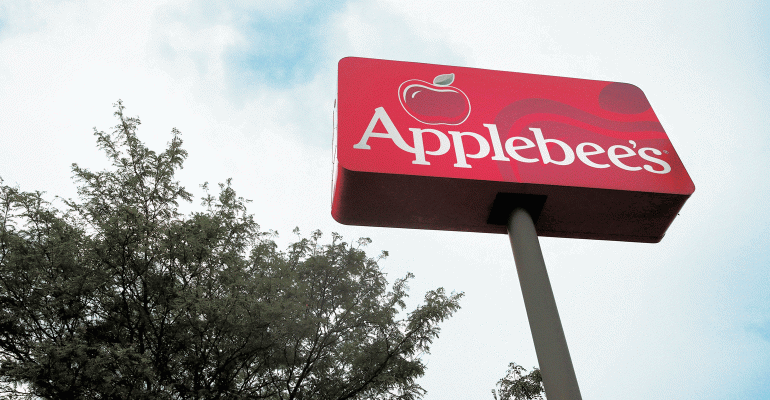During Dine Brands Global Inc.’s latest earnings call, executives at the Glendale, Calif.-based parent company of Applebee’s and IHOP detailed an overwhelmingly positive quarter. Applebee's domestic systemwide comparable same-restaurant sales increased 5.7 percent and the brands to-go sales grew just over 30 percent in the quarter. After a few years of tension, executives said franchisee relationships were healthy. But one franchisee begs to differ.
The brand’s second-largest franchisee, RMH Franchise, which operates over 100 restaurants, a filed bankruptcy over unpaid royalties in May and has continued an ongoing dispute recently outlined in a Business Insider article.
This case could just push Dine Brands to rethink its asset-light,100 percent franchised model that the company prides itself on.
“We will always focus on doing what’s best for the brand,” a Dine Brands spokesperson wrote in an email. “Specific to this case, we are willing and able to start the process of taking over restaurants, should that be the right resolution.”
 CEO Steve Joyce, left, hinted at this change of heart during the earnings call in early August.
CEO Steve Joyce, left, hinted at this change of heart during the earnings call in early August.
“We're currently working on solutions for the remaining franchisees that need assistance and expect to have these resolved within the next couple of months. Please note that we will not comment on individual franchisees,” Joyce said. “Now, as part of the resolution process, we do have the ability to selectively take back and manage restaurants on an interim basis until these units are free franchised.”
After RMH’s filing, Dine Brands filed a lawsuit claiming that RMH stopped paying royalties to the company beginning around June 2017 and therefore terminated its franchise agreement. Dine Brands also claims that RMH owes the company more than $23 million in unpaid and lost future royalty fees.
“This is an unfortunate situation and one that we worked tirelessly to avoid,” the Dine Brands spokesperson wrote. “Despite our best efforts, the private equity company took risks on behalf of RMH that resulted in default of their obligations to us as the franchisor.”
That private equity investment firm is ACON Investments. Along with ACON, RMH began acquiring Applebee’s in 2012. It currently operates Applebee’s in Ohio, Indiana, Illinois and elsewhere in the U.S.
According to RMH, the agreement was not terminated. Rather, franchisee argued in court filings, the stop in payments stems from an infamous menu flop. And RMH is demanding that Dine Brands reimburse the franchisee for damages.
In 2016, before Dine Brands had changed its name from DineEquity, Applebee’s launched a comprehensive rebranding effort that put wood-fired grills at the center of the menu. It was a bold move by former CEO Julia Stewart, who had spent years selling company-owned restaurants and converting Applebee’s into an all-franchised brand. The wood-fired grill overhaul was a massive attempt to turn around sinking sales that involved the installation of new equipment and related local permitting, working with vendors on new meat specs, creating advertising and merchandising and training employees.

What Stewart hoped would be a “big wow” fell flat, sending same-store sales deeper into decline. Stewart resigned less than a year later.
Franchisees, meanwhile, had invested handsomely in the attempted overhaul.
In court documents, RMH calls the plan “catastrophic” and states before rolling out the changes Dine Brands “had every indication” it “would be a failure.”
Greg Flynn, chairman and CEO of Apple American, Applebee’s largest franchisee, characterizes the wood fire grill menu a bit differently.
“I think basically RMH’s business suffered like all of ours did,” Flynn said. “It was tough, but we made it.”
Now, Flynn said, the company and Applebee’s have found their voice and the “executives are good. The best I’ve seen in 20 years.”
Applebee’s 100-percent franchised business model relies on the fees paid by franchisees, and as Flynn noted, a large franchisee refusing to pay impacts all.
“Most importantly, in my point of view, is the ad fund,” he said. Although some of the decisions the parent company made adversely affected sales and profit, he said, “the rest of us made our” payments.
Now, Dine Brands is in a position to potentially take over RMH’s Applebee’s locations.
RMH declined to answer whether Dine Brands has taken any actions toward doing so. RMH did state through its brand manager, Robin Jenkins, that “RMH Franchise owns and continues to operate its 146 Applebee’s locations.”
According to the Wall Street Journal, ACON is seeking more cash collateral to continue operating the business through August while it develops a reorganization plan, but also prepares bid procedures for outside parties interested in buying its assets.
Flynn, for his part, said he is “certainly going to look into” the possibility of taking over RMH’s locations. “My personal belief is that it’s a superb time to get into the businesses,” he said. “We’ll look at it, but my worry is that a bidding war gets too strong.”
Contact Gloria Dawson at [email protected]
Follow her on Twitter: @GloriaDawson




